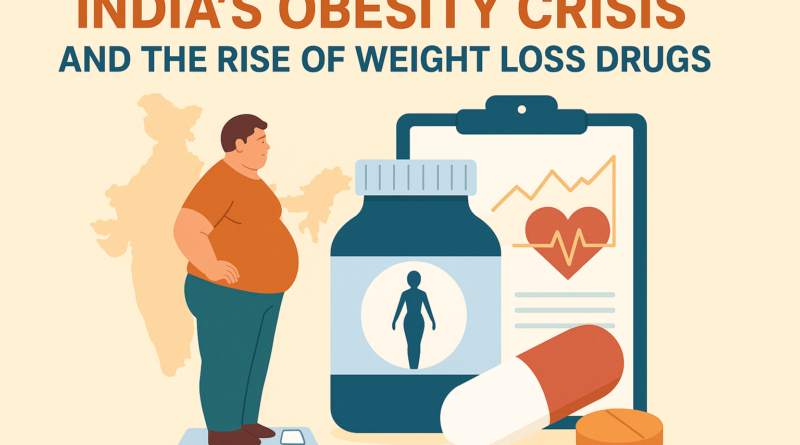India’s Obesity Crisis and the Rise of Weight Loss Drugs: A Growing Concern
India is currently grappling with a growing obesity crisis—a reflection of global health trends. Driven by sedentary lifestyles and unhealthy daily habits, urban populations are particularly vulnerable. With limited physical activity, poor dietary choices, and increased screen time, the issue is escalating rapidly. Obesity not only affects appearance but also leads to serious health complications such as high blood pressure, liver issues, and digestive disorders.
Globally, countries like Tonga report obesity rates as high as 70.5% among adults. Closer to home, India is witnessing an alarming rise in obesity cases, fueling a growing market for anti-obesity drugs. These medications are designed to help reduce body weight by suppressing appetite, blocking fat absorption, or increasing metabolism.
Why Are Slimming Pills So Popular in India?
In 2025, the rising prevalence of obesity in India is driving demand for advanced weight-loss drugs like semaglutide and tirzepatide. While these medications can be effective, they carry risks such as gastrointestinal issues, gallbladder disease, fractures, liver damage, and even vision loss. High costs and limited accessibility further complicate their safe use.
In the digital age, many people spend hours scrolling through social media while remaining physically inactive. This sedentary behavior reduces daily calorie expenditure, contributing significantly to weight gain. Influencers often glamorize slimming pills with dramatic before-and-after images and sponsored posts, often masking the truth: false claims, hidden side effects, and health risks.
In a society chasing quick results and ideal body standards, such trends thrive amidst weak regulations and rising body image anxiety.
India’s Anti-Obesity Drug Market: A Billion-Dollar Boom
The global anti-obesity drug market, valued at USD 12.8 billion in 2024, is projected to grow to USD 19.6 billion by 2025, and a staggering USD 104.9 billion by 2035, with a CAGR of 18.3%.
India mirrors this trend:
- By 2025, over 135 million Indians are expected to be overweight.
- Punjab leads with the highest obesity rates, especially among women, followed by Delhi, Kerala, Goa, and Puducherry.
- Companies like Novo Nordisk (Wegovy) and Eli Lilly (Mounjaro) have launched their products in India, tapping into a growing population in need of obesity treatment.
- Domestic pharma firms are preparing affordable generics by 2026, promising to expand access.
Side Effects of Anti-Obesity Drugs
These medications—though helpful—can cause significant side effects. Common issues include:
- Nausea, vomiting, diarrhea, or constipation
- Stomach pain, fatigue, dizziness, and headaches
- Injection site pain or swelling
Rare but serious effects:
- Gallbladder or kidney problems
- Pancreatitis
- Hair loss
- Acute kidney injury (especially with semaglutide)
Doctors warn against misuse:
“We are seeing a rise in over-the-counter and online misuse of imported weight-loss injections. This is dangerous. I’ve treated patients with severe dehydration, abdominal pain, and anxiety after unsupervised use.”
— Dr. Meena Jain, General Physician, Jaipur
“GLP-1 agonists like semaglutide are game-changers, but patients often neglect dietary guidance, resulting in rebound weight gain.”
— Dr. Arvind Kumar, Diabetologist, Apollo Hospitals, Chennai
Additionally, herbal slimming products can pose risks:
- Mental health issues like anxiety, insomnia, and panic attacks
- Hormonal imbalances in women: irregular periods, thyroid dysfunction, infertility, and mood swings
- Unregulated ingredients affecting brain function and reproductive health

Government Action Against Unsafe Drug Use
“Fitness ka dose, aadha ghanta roz” — PM Modi
Under the Fit India Movement, the government encourages citizens to engage in 30 minutes of daily physical activity—yoga, walking, or workouts—to prevent obesity. Celebrities like Shilpa Shetty, Akshay Kumar, and Sara Ali Khan are strong advocates of this lifestyle.
Major initiatives:
- Fit India Movement
- International Yoga Day
- Khelo India
- Poshan Abhiyan
The Central Drugs Standard Control Organization (CDSCO) regulates the sale and use of weight-loss drugs in India under the Drugs and Cosmetics Act, 1940. Approved drugs currently include:
- Orlistat
- Semaglutide
- Tirzepatide
Tackling Black Markets and Online Misuse
The Ministry of Health must:
- Tighten online sales regulations
- Monitor over-the-counter abuse
- Launch public awareness campaigns
- Improve access to legitimate medicines
- Educate citizens on the dangers of unprescribed drugs
With increasing concern over influencer-led promotions and online misinformation, strong regulatory oversight is vital to protect public health.
Future of Anti-Obesity Drugs in India
India’s anti-obesity drug market has immense potential, but key challenges must be addressed:
- Affordability
- Long-term safety
- Equitable access
The government’s PLI (Production Linked Incentive) Scheme supports domestic manufacturing and R&D in pharmaceuticals. Cutting-edge technologies like GLP-1 receptor agonists are revolutionizing obesity treatment.
Digital Solutions Leading the Way
Apps like MyFitnessPal, HealthifyMe, and Fitbit are enabling personalized fitness journeys, while AI-driven platforms are offering behavior insights and real-time health coaching. From e-pharmacies to online doctor consultations, technology is bridging the accessibility gap.
To ensure ethical practices:
- The government must regulate misleading digital promotions
- Launch science-based campaigns
- Promote physical education in schools and colleges
- Support nutrition literacy and training programs for youth
Conclusion
India holds a promising future in the anti-obesity drug market, driven by increasing demand for effective solutions and rapid growth in digital healthcare. However, this momentum must be matched with strong regulations, ethical marketing, and public health education.
The government should also explore safe, doctor-recommended Ayurvedic and herbal treatments known for minimal side effects. Digital platforms can play a transformative role by sharing inspiring health stories, promoting fitness challenges, and amplifying expert voices.
With responsible governance, innovation, and awareness, India can successfully combat the obesity epidemic—paving the way for a healthier, stronger, and more informed nation.
For more such interesting blogs, please visit: https://vichaardhara.co.in/


